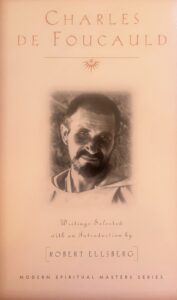 Charles de Foulcauld, Writings Selected with an Introduction by Robert Ellsberg.
Charles de Foulcauld, Writings Selected with an Introduction by Robert Ellsberg.
Charles De Foucauld (1858-1916) was born into a French aristocratic family. As a student he was affable, agnostic, lazy, pudgy, and gluttonous. He surprised everyone with his success as a military officer, serving in Morocco and other areas in and around the Sahara. He then gained recognition for exploring uncharted areas of Morocco and Algeria.
Somewhere along the line, he became so impressed with the devoutness of the Moslems he encountered in his travels that he resolved to re-embrace his Catholic faith. He joined the Trappist order, became a priest, and lived as a hermit, first in Nazareth, and then, for many years, in the most remote region of the Algerian Sahara, a lone Christian in a Moslem land.

De Foucauld led an incredibly austere life, even for a Trappist. He worked by seeking out the lowliest jobs, lived in the barest of bare-bones huts, never preached, welcomed all, studied theology very little, and wrote even less. He wanted to start an order of small communities living in this way, but was unable to attract anyone. He was shot and killed by tribal bandits, alone and unheralded. The reasons for his murder were never completely clear; likely it had to do with his being a Christian and his cooperation with the French military.
Although de Foucauld seemed to be something of a contemplative failure in his day, his strong faith and strong example inspired others to begin religious orders, perhaps most notably the Little Brothers of Jesus, founded in 1933.
In 2022, Charles de Foucauld was canonized by Pope Francis.
My interest in de Foucauld was piqued by Thomas Merton, who praised him for the clarity, simplicity, and deep insights of his contemplative reflections. High praise indeed!
De Foucauld is indeed easy to understand, at least on the surface; one could spend hours, days, or even years reflecting on many of his ideas. Fundamentally, de Foucauld’s spirituality rests on principles he explains with ease, yet are exceedingly difficult for anyone including himself to put into practice. These principles include:
- Imitating what he calls the “hidden life” of Jesus — that is, his private life before he began his public ministry. Jesus lived in obscurity, in a remote area, among the poorest of the poor, engaged in manual labor, in the midst of the faithful, unfaithful, and those of other faiths. He taught by example, not words, in serving others and through quiet prayer. This is the blueprint of life for de Foucauld.
- De Foucauld says, “There is nothing from the Gospel that has impressed me more or had a bigger effect on my life than this: ‘As long as you did it to one of these my least brethren, you did it to me.'” Again and again he stresses the importance of loving all, welcoming all, helping all, bringing the Good News to all — especially those most in need of it and least likely to encounter it.
- Total focus on Jesus, total submission to God’s will, total indifference to things of the world must be at the heart of all we think, do, and say. To the extent we can do this, we please God. Simple? No! De Foucauld struggled with this hard teaching as much as any of us, but he understood that failure only means asking for forgiveness and continuing the effort. The bad things that happen to us, he counsels, are things we should rejoice in, as they are given to us by God as a way to make us holy. It was through suffering on the cross that Jesus did his greatest good: and thus for us, suffering is a means to doing great good and uniting ourselves in spirit with the Lord.
Exploring these spiritual virtues of charity and faith, suffering and sacrifice, seem to be most appropriate for the season of Lent. Perhaps so, but I think these ideas are just as appropriate for Advent, if not more so. Christmas has become the celebration of everything except Christ. Contrast the shopping and partying that basically consume Advent with this reflection:
“Real faith, faith which inspires all one’s actions, faith in the supernatural which strips the world of its mask and reveals God in all things; which abolishes the notion of ‘impossible,’ and empties the words ‘anxiety,’ ‘danger,’ and ‘fear’ of their meaning; which gives life calm, peace, deep joy, like a child holding its mother’s hand; which detaches the soul so completely from earthly things by showing up their total lack of importance and their childishness; which bestows such confidence in prayer, the confidence of a child asking its father for something useful; the faith which shows that ‘apart from doing what is agreeable to God, everyone is vanity’ … oh, how rare that is! My God, give me real faith! My God, I believe, help the little faith I have!”
This is the spirit of faith, the perspective, that we ought to strive for. The point de Foucauld makes here, and stresses repeatedly, is not to become sour and dour on account of the world, but to discover the true, complete, and unassailable joy of detachment from the world.
When we love God and understand we are loved by God, then and only then do the gift-giving and celebrations of the season bring true joy to others and to ourselves. Then and only then do the irritations and excesses of the season cease to deflect and destroy our joy.
